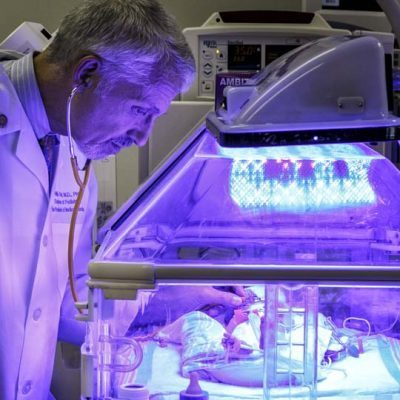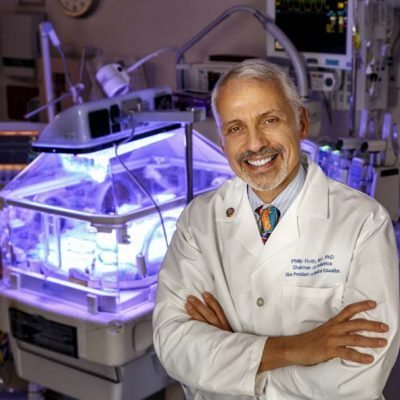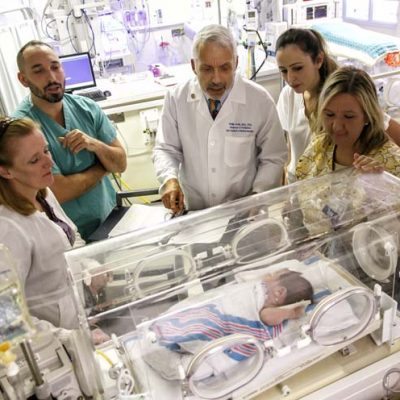
SIUH’s Department of Neonatology offers state-of-the-art medical care to ill and premature newborn infants
by Jessica Jones-Gorman • Photos By Amessé Photography
For Dr. Philip Roth, who serves as director of neonatology at Staten Island University Hospital and chair of its Department of Pediatrics, the most fulfilling part of his job is seeing a once critically ill patient thrive.
“Just this morning, a mother brought in her baby who is now close to one years old,” Dr. Roth explained. “Here was this smiling, chubby little baby boy with bright eyes who not so long ago was in our unit weighing only two pounds, connected to a respirator. He was once so critically ill, it’s hard to believe that in just one year’s time the family’s outcome would be so positive and amazing. To me, it was such an inspiring moment, and undeniably the most wonderful part of this specialty.”
Dr. Roth, who has been the head of the hospital’s neonatology department for 18 years, says it’s the personal side of his profession that requires focus in each and every case.
“We provide family-centered care in a state-of-the-art setting,” he explained. “This is a high-tech specialty, but we are also focused on family involvement, because parents need to be engaged, involved and know exactly what’s happening at every moment. When you’re treating newborns, you are also treating parents who have just been through what should have been a normal, happy time of life but instead has taken a turn and caused a lot of stress and difficulty.”
That’s why Roth’s team—which includes four other neonatologists, eight nurse practitioners, two residents who rotate through on any given month, and dozens of specialized nurses—concentrates on more than just progressive technology and equipment.
“I think when you talk about cutting-edge, it’s not just about technology,” Roth explained. “Neonatology is an interesting specialty in that we have to bridge the gap between technology and being patient and family-centered. We do this through things like enhanced breastfeeding support, round-the-clock visitation, skin-to-skin care, and bedside rounding with the family present on a daily basis.” Roth and his staff are also consistently in touch with a number of different subspecialties— cardiology, gastroenterology, and neurology, depending upon the nature of a patient’s problem—to coordinate optimum care.
“There is a huge multi-disciplinary. approach here,” he said. “It’s very important to coordinate all of the departments and bring a unified plan of care to each and every one of our patients.”
For the doctor, who also serves as the hospital’s vice president of medical education (overseeing all education programs across all departments), working closely with colleagues across all divisions allows his staff to positively impact patients—the reason he entered the field of medicine in the first place.
“I decided to go into medicine when I was in college,” he recalled. “I was a chemistry major…fascinated by science and the biology of how things work. I appreciated the field of medicine because it allowed me to impact the most amount of people using science as a vehicle.” He ultimately chose neonatology and pediatrics as specialties.
“I felt both game me an opportunity to make a positive impact that could literally alter someone’s life,” he said. “When you help a newborn baby overcome a health obstacle, you give them back 70, 80…even 90 years of life. I also felt that neonatology offered me this really unique interaction and allowed me to treat not just the patient but the family as well.”
Dr. Roth completed his undergraduate studies at Columbia University, where he also earned his medical
degree and PhD. He completed a residency in pediatrics at the Children’s Hospital of Philadelphia, a fellowship in neonatology at the University of Pennsylvania, and took his first job in neonatology at the Albert Einstein Montefiore Medical Center in New York City.
“At that time, I was spending three quarters of my time in research and one quarter in clinical,” he recalled. “I really wanted to shift my work towards clinical, so when an opportunity came in 1997 to become director of neonatology at Staten Island University Hospital, I gladly accepted.” He added
that in the past two decades, there have been a number of changes in neonatology and in the way that
care is delivered at the facility.
“When you help a newborn baby over comea health obstacle, you give them back 70, 80…even 90 years of life,” Dr. Roth explained.
“We began to require that a neonatologist remain in the hospital round the clock, and we enhanced our abilities and technology to monitor patients,” said Roth. “We’ve added more advanced respirators, began treating babies in respiratory failure with inhaled nitric oxide, and started doing total body hypothermia for infants who suffer from hypoxic-ischemic encephalopathy [a type of brain damage that occurs when
an infant’s brain doesn’t receive enough oxygen].”
In pediatrics, Roth oversees 25 full-time pediatricians and is responsible for the training of 24 residents who participate in a three-year program at the hospital. His staff also participates in regular community outreach and health advocacy across the borough.
In terms of future expansion, he was proud to announce that a new Women’s and Infant’s Center just earned approval and plans will be finalized for the space this coming year.
“It will be a brand new, state-of-the-art facility which will serve as a boost to our already burgeoning program,” Dr. Roth concluded. “We already provide excellent care, but it will be so much nicer to provide it in a facility equipped with the latest technologies and advancements.”
Staten Island University Hospital
475 Seaview Avenue / 718.226.9000 / siuh.edu






